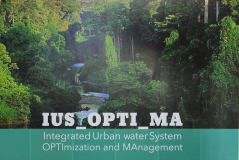
Decision support system for integrated, dynamic and eco-efficient management of the collection, treatment and disposal systems of urban waste waters (URBAN WATER SYSTEM).
The Legislative Decree 152 of 3 April 2006 redefines the Integrated Water Service (IWS) by introducing the principles of efficiency, effectiveness and economy, in accordance with national regulations and directives. The managers of the IWS, in Italy as in other EU countries are called to manage the significant problems associated with aging of infrastructure, the shortcomings and losses, water quality, the maintenance costs, the environmental impact.
In purification sector, changes in environmental regulations have led to massive investment in sewage networks and on treatment plants to adapt these systems to the new standards. Nevertheless, there are significant difficulties in purifying sector often due to the presence of illegal dumping.
The IUS_OPTI_MA System
To meet these needs we have developed IUS_OPTI_MA, a decision support system for integrated, dynamic and eco-efficient management of the collection, treatment and disposal systems of urban waste waters (URBAN WATER SYSTEM).
The system is based on an ICT platform, which supports the integrated approach to the urban water system and which coordinates the general management and the remote management of the municipal purification plant with that of the sewage system that supplies it.
The role of the IUS_OPTI_MA integrated system is to transfer the field information to the user and to automatize the processes of collecting, treatment and disposal through the monitoring and remote control of devices and plants.
Attention is also paid to environmental monitoring. The system can both detect critical variables triggering potentially critical phenomena and "alert" operators in the event of potentially damaging events for the plant and the external environment. The aim is to provide decision support for the rational and sustainable management of the Urban Water System, reducing energy consumption and combining production efficiency with minimization of environmental impact.
The IUS_OPTI_MA system maintains the absolute security of the process and is the only industrial system built completely on ANSI standards that uses hardware platforms, operating systems and communication technologies available on the market. In fact, it is the first system able to allow real-time control of critical processes based on standard PC platforms.
It is considered the most reliable and high-performance system in real-time applications, providing performances and capabilities that have not been reached so far, thanks to the fact that IUS_OPTI_MA has been studied on the basis of multi-tasking and open network.
The IUS_OPTI_MA process executes the control algorithms through instant and transparent access to an updated, distributed, global and relational database. This type of database access allows for the distribution over multiple independent units of functions that would normally reside in a single processor. Because each unit operates in parallel and can concentrate on control functions without interruption, system performance can not degrade due to large amounts of simultaneous events.
The system is able to monitor the sewage loads that can be placed in drainage networks, in order to optimize the management of the purification and energy system and to realize the districtization of the networks (even the existing ones), with the aim of:
- Estimating the loads of meteorological water that could be discharged into the urban wastewater transport and purification system.
- Being able to identify, at the moment of entry, the improper loads (not allowed) that would represent a criticality for the treatment and disposal of wastewater, then "tele-prepare" the purification reactor to overcome the criticality.
- Being able to identify the location of the polluting substances in the network.
The system was developed within the homonymous IUS_OPTI_MA project during which the integrated system model was defined and implemented, and subsequently tested at the Acquedotto Pugliese plant in Castellana Grotte.
The project was developed by an ATS which included Planetek Italia (leader), Acquedotto Pugliese SpA, Biotec Srl, CNR-IRSA, Faver SpA, Geophysical Applications Processing (GAP) Srl, IA.ING Srl, Intesis Srl, Politecnico di Bari.
Project information
Client information:
AQP SpA
Application fields:

